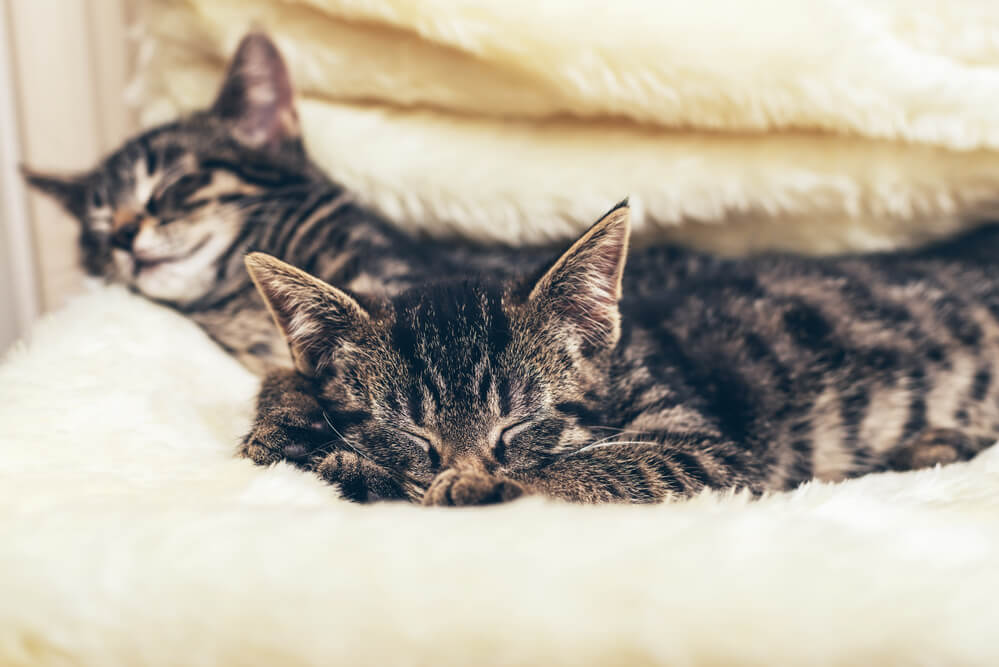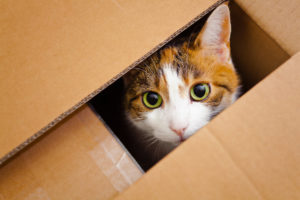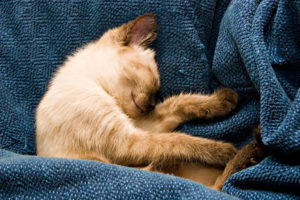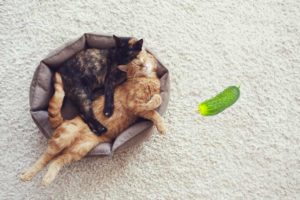Cats sleep between 12 and 16 hours every day. During this time, they will usually begin by sleeping on their backs and then gradually flop over onto their sides or front, depending on how comfortable it is. Cats can also enter REM (Rapid Eye Movement) sleep like humans do which enables them to dream and move about – something we don’t believe is possible for dogs.
Cats will also sleep whenever they want to; it’s not unusual for them to take a nap in the morning, then wake up and play around excitedly before settling into another long snooze in the afternoon, simply because that’s what suits them. Cats are very good at regulating their own sleeping habits. If they want to sleep, they will – if they don’t, there won’t be anything you can do to make them.
Some cats are more active at night while others prefer the daytime; this is often related to their individual anatomy and physiology which means that even within a single breed of cat, some individuals may be more nocturnal than others. There’s no right or wrong way for a cat to sleep, but whatever hours they do clock up, you can be sure they will spend the majority of their time completely zonked out.
Why Cats Sleep So Much?
Cats – and humans – tend to sleep a lot because it is a very efficient way of resting. When cats sleep, their body systems can shut down to the bare minimum required for survival. It is only when they are in this minimally active state that their bodies have time to heal and repair any damage or injury that might have occurred during the day.
The more regularly a cat sleeps, the healthier it will be so if you notice your cat sleeping a lot, this is usually a good sign. It doesn’t mean there’s anything wrong with them because they sleep so much; it just means that they’re healthy and happy.
Cats do enjoy periods of wakefulness, particularly if their environment becomes too quiet or boring for them. This can result in cats becoming destructive and mischievous, which is why it’s important to provide them with toys and things to do. This will help to prevent your cat from getting “over tired” and, as a result, sleeping more than usual.
Do cats fall in deep sleep?
Cats usually fall asleep as a whole, as opposed to humans who often drift off slowly and wake up during the night. This means that cats are extremely vulnerable when they first fall asleep and should be watched over carefully for this reason.
When your cat is in its comatose state, their body will remain virtually motionless and their muscles will inhibit. However, cats do dream and their paws may twitch or move around as they sleep; this is because of the activity that goes on in their brain during REM sleep which is the same kind of activity that occurs in humans.
The fact that cats can enter such a deep state of relaxation allows them to keep their body systems operating at minimal levels – a luxury not commonly available to human beings.
How Cats Sleep?
Cats that sleep on their side will typically place one of their front paws over their head, sometimes even gently resting it in the corner of their mouth. This is called the comfort reflex and helps cats to relax, reducing stress levels in much the same way as
Should I let my cat sleep all day?
Cats are very good at regulating their own sleeping habits. Do not worry about letting your cat sleep if it wants to! Sometimes they will wake up and want to play for a little while first. Your
cat will let you know how much sleep it needs.
Cats can not get into deep sleep if they are in danger, so they have to stay alert to what is going on around them. It is therefore natural that they should spend some time awake even when they are tired, so don’t worry if your cat stays quietly resting in one spot during the day while you are at work.
How to wake up cats?
Cats do not like to be woken up suddenly, even if it is for their own good. You should therefore try to make them as comfortable as possible before waking them up, and only do so when it is essential that they get up (for example, if they are in a dangerous or uncomfortable position). Try not to be too rough with your cat.
Cats will want to keep on sleeping, even if they have been woken up suddenly and should therefore be left alone until they feel ready to get up themselves.
What are the most known cat sleeping habits?
There are many different cat sleeping habits, but the most common behaviors involve curling up in a tight ball to conserve warmth or stretching out in a straight line with legs splayed.
Cats also sleep deeply, which is why it can be problematic when they get into uncomfortable positions! Take care of your pet to avoid this situation.
When cats are sick, they usually sleep more than usual.
Cats are subject to several of the same health problems as humans, including obesity, arthritis and diabetes. This means that your cat’s sleeping habits may change if your pet is suffering from one of these conditions or any other diseases or disorders.
If you notice any changes in your pet’s sleeping habits, it is important to take them along to your vet so that they can receive the necessary treatment.
Cats sleep a lot compared to humans, but this should not be a problem as long as their living environment is stimulating and comfortable.
Is it also true for an indoor cat?
Indoor cats will sleep as much as they want, as long as their living environment is stimulating and comfortable. In fact, kittens spend a lot of time sleeping to make up for the time lost from hunting. Indoor cats, therefore, need more stimulation than those who are allowed outside to stimulate them and stop them from getting bored or developing behavioral problems.
Is it different from adult cats?
Adult cats sleep more than kittens. Their sleeping pattern changes as they grow and their metabolism slows down. Adult cats typically sleep between 12 and 16 hours each day, with older cats often needing up to 20 hours of sleep a day.
The cat’s brain will enter into a deeper form of sleep than it normally would outside, such as during the day.
All cats, from young to old, need a calm and comfortable environment in order to get the rest they require.
Does it depend on breed?
It does not depend on breed so much as age and lifestyle. The bigger breeds of cat tend to have higher metabolisms and therefore sleep less than small breeds such as the Burmese or Persian.
In addition, outdoor cats tend to sleep more during the day than indoor cats as they have a lot of energy from being out hunting, which can confuse owners into thinking that their cat only needs less sleep. This is not so – all cats need between 12 and 16 hours of sleep a day in order to stay healthy.





